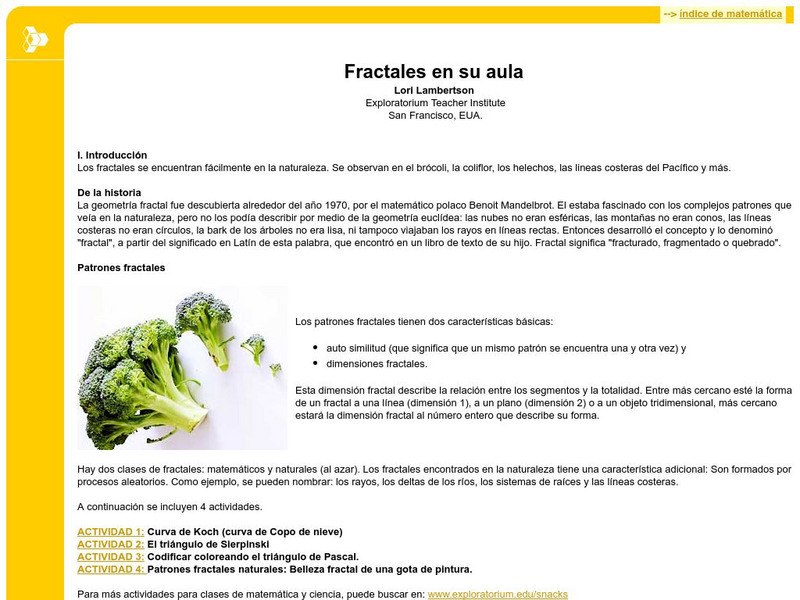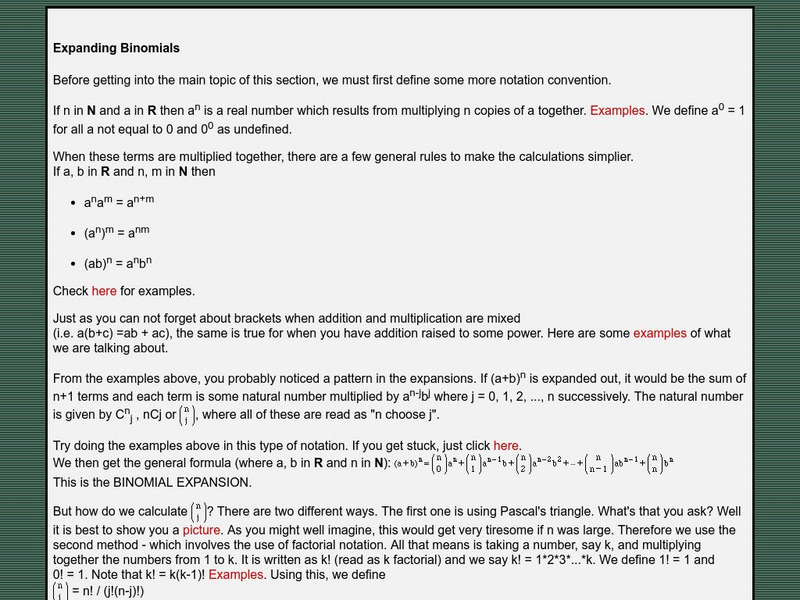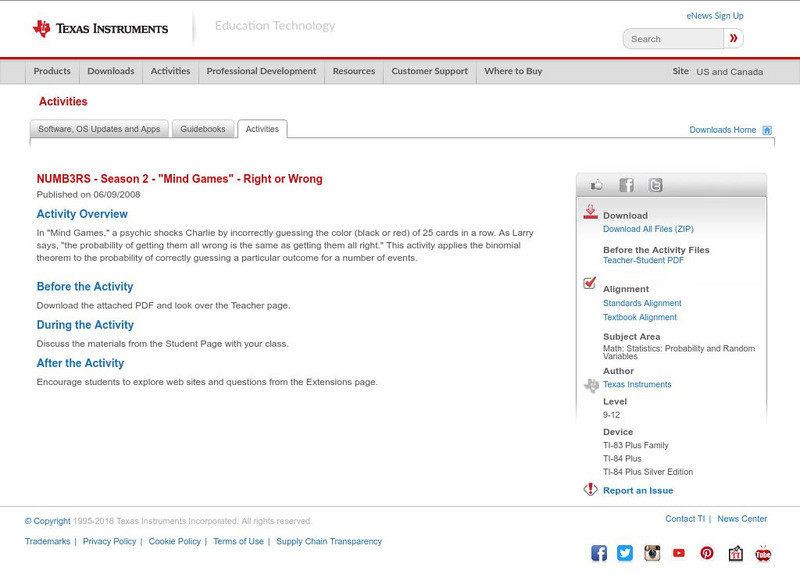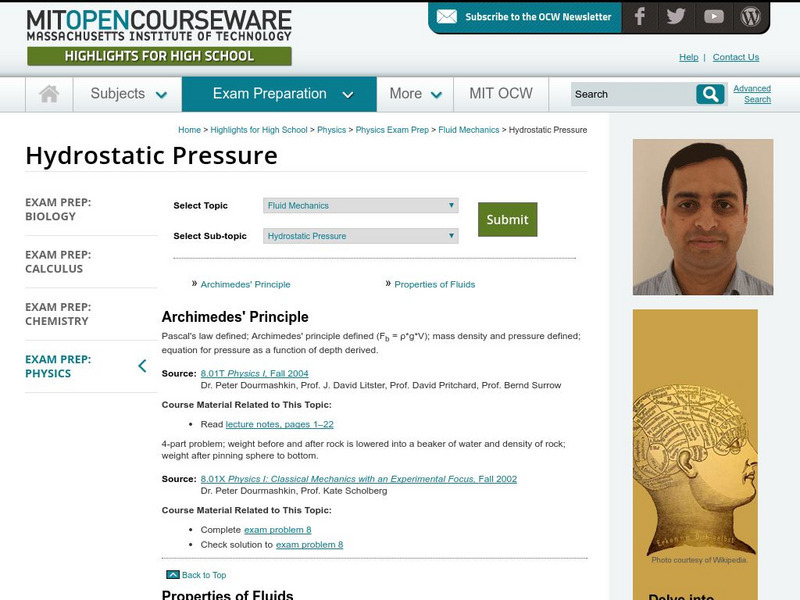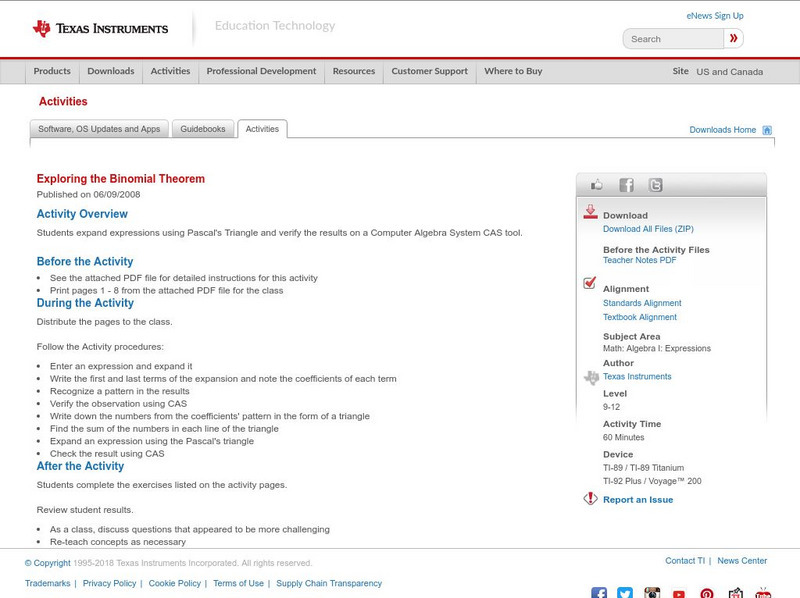ClassFlow
Class Flow: Pascal
[Free Registration/Login Required] Students will be able to identify patterned numbers as related to Pascal's Triangle.
New Advent
Catholic Encyclopedia: Blaise Pascal
Excellent discussion of the life and work of this great scientist and mathematician. Describes his range of interests and notes his many contributions. Please note that ?The Catholic Encyclopedia? is a historic reference source and...
National Council of Teachers of Mathematics
The Math Forum: Ask Dr. Math: Binomial Expansions and Pascal's Triangle
This site answers a student's question inquiring about the definition of a binomial expansion, where it would be used, and why.
Fundación Cientec
Fractales en Su Aula
Lesson plans and activities available in Spanish dealing with fractals. Some are also available in English. Activities are step by step and easy to understand. Included topics are the Koch Snowflake, Sierpinski's triangle, and Pascal's...
TeachEngineering
Teach Engineering: Under Pressure
Students learn about Pascal's law, an important concept behind the engineering of dam and lock systems, such as the one that Thirsty County wants Splash Engineering to design for the Birdseye River (an ongoing hypothetical engineering...
TeachEngineering
Teach Engineering: Locks and Dams
Students are introduced to the structure, function and purpose of locks and dams, which involves an introduction to Pascal's law, water pressure and gravity.
Curated OER
University of St Andrews: Blaise Pascal
This site from the University of Saint Andrews provides a short biography of Pascal. Takes a philosophical angle. Features links to existentialist philosophy, seventeenth and eighteenth century literature, and philosophy pages.
Curated OER
University of St Andrews: Blaise Pascal
This University of St. Andrews site contains biographical information and achievements of Blaise Pascal.
Curated OER
Science Kids: Science Images: Blaise Pascal
This image is of French physicist Blaise Pascal. He developed work on natural and applied sciences as well being a skilled mathematician and religious philosopher.
Curated OER
Smithsonian Libraries: Scientific Identity: Blaise Pascal (1623 1662)
A portrait of Blaise Pascal from the Dibner Library of the History of Science and Technology, made available through the Smithsonian Institution's Scientific Identity Collection.
Curated OER
Smithsonian Libraries: Scientific Identity: Blaise Pascal (1623 1662)
A portrait of Blaise Pascal from the Dibner Library of the History of Science and Technology, made available through the Smithsonian Institution's Scientific Identity Collection.
University of Saskatchewan (Canada)
University of Saskatchewan: Expanding Binomials
Provides discussion on binomial expansion. Works through an example of this concept and provides example problems.
History of Computing Science
History of Computing Science: First Mechanical Calculator
Blaise Pascal, the seventeenth-century French mathematician, thinker, and scientist, built the first mechanical adding machine in 1642 based on a design described by Hero of Alexandria (2 CE) to add up the distance a carriage traveled.
Great Idea Finder
The Great Idea Finder: Adding Machine
The Great Idea Finder profiles the adding machine, invented by nineteen-year old mathematician Blaise Pascal in the year 1642.
Texas Instruments
Texas Instruments: Numb3 Rs: Right or Wrong
Based off of the hit television show NUMB3RS, this lesson helps students draw a connection between binomial expansions, probabilities, combinations, and Pascal's Triangle. The lesson is framed in the context of randomly guessing a number...
Mathigon
Mathigon: Combinatorics: World of Math
This lesson focuses on Combinatorics, a branch of mathematics which is about counting. It includes 5 sections: Factorials, Permutations, Combinations, Combinatorics and Pascal's Triangle, and Combinatorics and Probability with examples...
Mathigon
Mathigon: Probability and Discrete Math: Introduction
This is an introduction to the study of probability. It tells the story of two of the greatest mathematicians, Blaise Pascal and Pierre de Fermat, who used coin tosses of heads or tails to determine who paid the bill. It led to the...
National Gallery of Art
National Gallery of Art: Cazin in the Quarry
Using Cazin's painting The Quarry of Monsieur Pascal near Nanterre, students will hypothesize about the workings, setting, and size of this French quarry. Then, applying his working method of "memory painting," they will draw or paint a...
Massachusetts Institute of Technology
Mit: Open Course Ware: Hydrostatic Pressure
Students explore hydrostatic pressure. Some topics examined in the activities are Pascal?s principle, hydrostatic pressure, and Archimedes? principle. The resource consists of video clips, lecture notes, practice problems, and exam...
Texas Instruments
Texas Instruments: Using the Ti 83/84 to Explore the Binomial Theorem
This lesson will introduce students to the binomial theorem through a variety of activities. Pascal's triangle and probabilities will be explored through problem solving. The binomial theorem, combinations formula, and the binomial...
Texas Instruments
Texas Instruments: Exploring the Binomial Theorem
Students expand expressions using Pascal's Triangle and verify the results on a Computer Algebra System CAS tool.
Other popular searches
- Pascal's Triangle
- Pascal Triangle
- Pascal Triangle Lesson Plans
- Pascal's Principle
- Pascals Triangle
- Array Pascal
- Pascals Principle
- Pascal Principle
- Blaise Pascal
- Applets Pascal Triangle
- Pascals Law
- Pascal's Triangle Activity






